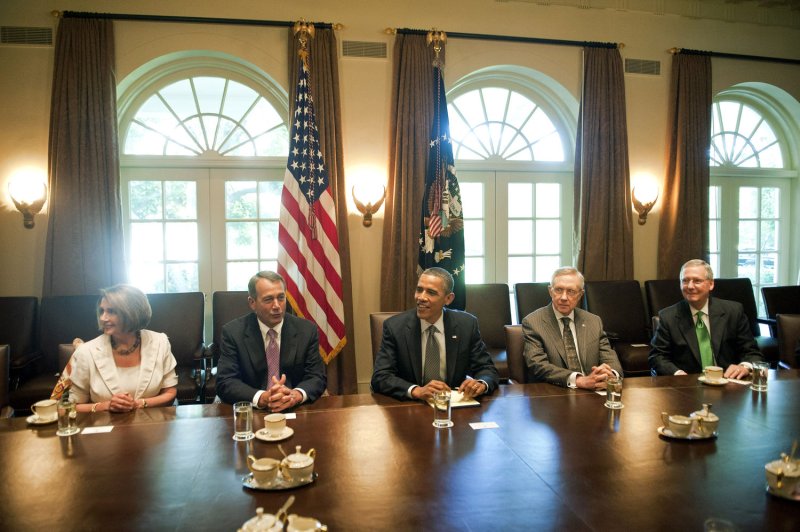President Barack Obama meets with congressional leaders as they continue budget negotiations at the White House in Washington on July 14, 2011. President Obama was joined by House Minority Leader Nancy Pelosi (D-CA), Speaker of the House John Boehner (R-OH), Senate Majority Leader Harry Reid (D-NV) and Senate Minority Leader Mitch McConnell (R-KY). UPI/Kevin Dietsch |
License Photo
WASHINGTON, July 18 (UPI) -- House Republicans will not bring a balanced budget amendment to the floor this week, a spokeswoman for Majority Leader Eric Cantor, R-Va., said Monday.
Roll Call reported the Cantor aide said leaders now hope to bring the constitutional amendment to the floor next week. Still on tap for Tuesday, however, is the so-called cut, cap and balance plan, which President Barack Obama has vowed to veto if sent to his desk, Roll Call said.
The proposal pushed by the House GOP would slash federal spending by $111 billion, limit it to 22.5 percent of GDP and require that Congress pass the balanced budget amendment -- all before raising the national debt ceiling by $2.4 trillion, which the Treasury says must be done by Aug 2.
The White House budget office said the bill would "lead to severe cuts in Medicare and Social Security," ABC reported.
White House officials joined in the full court press against the Republican plan in a conference call with reporters Monday.
"This plan isn't 'Cut, Cap and Balance,'" White House Communications Director Dan Pfeiffer said. "It's 'Duck, Dodge and Dismantle.'"
Pfeiffer said the plan would go further than the earlier budget plan proposed by U.S. Rep. Paul Ryan, R-Wis., making even deeper cuts in Medicare. The Ryan plan wouldn't cut Social Security, Pfeiffer said, but the new plan does.
Jason Furman, deputy assistant to the president for economic policy, said: "It's also important to understand that cuts of this magnitude would have ... devastating effects on the economy. ... In contrast the president is focused on cutting the budget by $4 trillion over the next 10 years" with phased reductions that would have a limited economic effect.
As for requiring the passage of a balanced budget before taking action on raising the debt limit, Furman said, "This amounts to holding the debt limit hostage."
House Speaker John Boehner, Cantor and Obama met at the White House Sunday night, Boehner's office told Politico, but no one budged.
"As we said throughout the weekend, the lines of communications are being kept open. But there is nothing to report in terms of an agreement or progress," a Boehner spokesman said.
Senate Majority Leader Harry Reid, D-Nev., said Monday the Senate would stay in session until an agreement is reached, The New York Times reported.
Behind the scenes, top Democrats and Republicans were reported to be mapping a new deficit-cutting plan similar to the $4 trillion one abandoned a week ago.
The lawmakers seek to create a new "grand bargain" similar to the one Obama proposed -- even as Obama and congressional leaders craft a fallback plan to raise the nation's debt ceiling, officials told The Washington Post.
The new version, being put together by an emerging committee of powerful lawmakers, might be ready by the end of the year, the Post said.
Boehner asked Obama to lay out specific cuts to so-called entitlement programs such as Social Security and Medicare, the network said.
"There are multiple tracks that are being discussed," White House Budget Director Jacob Lew told ABC's "This Week."
Obama and Boehner are both making the case to skeptical factions of their respective parties for a big deficit-cutting plan, with Obama saying getting the nation's fiscal house in order is in their best interest and Boehner telling his troops he didn't become speaker to do small things, the Post said.
The Standard & Poor's credit rating agency also says Washington must agree to reduce the federal debt by $4 trillion over 10 years for the United States to avoid an unprecedented credit downgrade.
Still in doubt among the top lawmakers is whether Tea Party-aligned conservatives in Congress would vote for a major deal.
Sen. Jim DeMint, R-S.C., said on WSBA, York, Pa., Monday, "We're going to find out if the Tea Party's still there in force in the next few weeks."
But some rank-and-file House Republicans are now discussing the possibility of slicing as much as $5 trillion from the federal budget in a decade, the Post said.
The entire national debt was roughly $5 trillion in 1997. It is now $14.3 trillion, with the prospect of default 15 days away.















